
Themes include the evolution and institutionalisation of African political parties; the unique historical, political and social circumstances that shaped their structures and functions.Morten Bøås In the governance trajectory, the authors question the relationship between African political parties and government; political parties and representation; political parties and electoral systems; and political parties and parliament. Case studies include Ethiopia, Ghana, Kenya, Botswana, Namibia, South Africa, Tanzania, Zambia, Zimbabwe and many others.

Public administration has evolved into an extraordinarily complex form of governance employing traditional bureaucracy, quasi-government public organizations, and collaborative networks of nongovernmental organizations. Analyzing and improving government performance—a matter of increasing concern to citizens, elected officials, and managers of the organizations themselves—has in turn become a much more fraught undertaking. Understanding the new complexities calls for new research approaches.
The Art of Governance presents a fresh palette of research based on a new framework of governance that was first developed by coeditor Laurence E. Lynn, Jr., with Carolyn J. Heinrich, and Carolyn J. Hill in their book, Improving Governance: A New Logic for Empirical Research. That book identified how the relationships among citizens, legislatures, executive and organizational structures, and stakeholders interact, in order to better diagnose and solve problems in public management.
This volume takes that relational concept into new realms of conceptualization and application as it links alternative institutional and administrative structures to program performance in different policy areas and levels of government. Collectively, the contributors begin to paint a new picture of how management matters throughout the policy process. They illuminate how, at different levels of an organization, leadership and management vary—and explore both the significance of structural systems and the importance of alternative organizational forms for the implementation of public policies.
The Art of Governance shows that effective governance is much more complex than paint-by-number. But if the variety of forms and models of governance are analyzed using advanced theories, models, methods, and data, important lessons can be applied that can lead us to more successful institutions.

The literature describing social conditions during the post–World War II Allied occupation of Germany has been divided between seemingly irreconcilable assertions of prolonged criminal chaos and narratives of strict martial rule that precluded crime. In The Art of Occupation, Thomas J. Kehoe takes a different view on this history, addressing this divergence through an extensive, interdisciplinary analysis of the interaction between military government and social order.
Focusing on the American Zone and using previously unexamined American and German military reports, court records, and case files, Kehoe assesses crime rates and the psychology surrounding criminality. He thereby offers the first comprehensive exploration of criminality, policing, and both German and American fears around the realities of conquest and potential resistance, social and societal integrity, national futures, and a looming threat from communism in an emergent Cold War. The Art of Occupation is the fullest study of crime and governance during the five years from the first Allied incursions into Germany from the West in September 1944 through the end of the military occupation in 1949. It is an important contribution to American and German social, military, and police histories, as well as historical criminology.

In the years between the American Revolution and the Civil War, there was an awkward persistence of sovereign rituals, vestiges of a monarchical past that were not easy to shed. In Awkward Rituals, Dana Logan focuses our attention on these performances, revealing the ways in which governance in the early republic was characterized by white Protestants reenacting the hierarchical authority of a seemingly rejected king. With her unique focus on embodied action, rather than the more common focus on discourse or law, Logan makes an original contribution to debates about the relative completeness of America’s Revolution.
Awkward Rituals theorizes an under-examined form of action: rituals that do not feel natural even if they sometimes feel good. This account challenges common notions of ritual as a force that binds society and synthesizes the self. Ranging from Freemason initiations to evangelical societies to missionaries posing as sailors, Logan shows how white Protestants promoted a class-based society while simultaneously trumpeting egalitarianism. She thus redescribes ritual as a box to check, a chore to complete, an embarrassing display of theatrical verve. In Awkward Rituals, Logan emphasizes how ritual distinctively captures what does not change through revolution.

Contributors. Ann Anagnost, Una Chung, Patricia Ticineto Clough, Steve Goodman, Sora Y. Han, Stefano Harney, May Joseph, Randy Martin, Brian Massumi, Luciana Parisi, Jasbir Puar, Amit S. Rai, Eugene Thacker, Çağatay Topal, Craig Willse

This volume addresses the most pertinent binational issues and how they are dealt with by both countries. In this important and timely volume, experts tackle the important problem of cross-border governance by an examination of formal and informal institutions, networks, processes, and mechanisms. Contributors also discuss various social, political, and economic actors and agencies that make up the increasingly complex governance space that is the U.S.-Mexico border.
Binational Commons focuses on whether the institutions that presently govern the U.S.-Mexico transborder space are effective in providing solutions to difficult binational problems as they manifest themselves in the borderlands. Critical for policy-making now and into the future, this volume addresses key binational issues. It explores where there are strong levels of institutional governance development, where it is failing, how governance mechanisms have evolved over time, and what can be done to improve it to meet the needs of the U.S.-Mexico borderlands in the next decades.
Contributors
Silvia M. Chavez-Baray
Kimberly Collins
Irasema Coronado
Guadalupe Correa-Cabrera
Pamela L. Cruz
Adrián Duhalt
James Gerber
Manuel A. Gutiérrez
Víctor Daniel Jurado Flores
Evan D. McCormick
Jorge Eduardo Mendoza Cota
Miriam S. Monroy
Eva M. Moya
Stephen Mumme
Tony Payan
Carla Pederzini Villarreal
Sergio Peña
Octavio Rodríguez Ferreira
Cecilia Sarabia Ríos
Kathleen Staudt


Cape Town after Apartheid focuses on urban renewal and urban security policies and practices in the city center and townships as this aspiring world-class city actively pursues a neoliberal approach to development. The city’s attempt to escape its past is, however, constrained by crippling inequalities, racial and ethnic tensions, political turmoil, and persistent insecurity. Samara shows how governance in Cape Town remains rooted in the perceived need to control dangerous populations and protect a somewhat fragile and unpopular economic system. In urban areas around the world, where the affluent minority and poor majority live in relative proximity to each other, aggressive security practices and strict governance reflect and reproduce the divided city.
A critical case for understanding a transnational view of urban governance, especially in highly unequal, majority-poor cities, this closely observed study of postapartheid Cape Town affords valuable insight into how security and governance technologies from the global North combine with local forms to create new approaches to social control in cities across the global South.


In Citizenship and Governance in a Changing City, Susan Ostrander shows how beneath current high levels of engagement by Somerville residents lies a struggle about who should be the city's elected leaders and how they should conduct the city's affairs. It is a struggle waged between diverse residents--relatively new immigrants and a new middle class-trying to gain a foothold in democratic participation, and the city's political "old guard."
Citizenship and Governance in a Changing City informs current debates about the place of immigrants in civic and political life, and the role of voluntary associations in local politics and government. In the process, Ostrander provides useful lessons for many midsize urban communities.

The sexual abuse scandal in the Catholic Church has been exacerbated in the minds of many by the dismal response of church leadership. Uncovered along with the abuse of power were decisions that were not only made in secrecy, but which also magnified the powerlessness of the people of the church to have any say in its governance. Accordingly, many have left the church, many have withheld funding—others have vowed to work for change, as witnessed by the phenomenal growth of Voice of the Faithful. Common Calling is indeed a call—for change, for inclusion, and a place at the table for the laity when it comes to the governance of the church.
By first providing compelling historical precedents of the roles and status of the laity as it functioned during the first millennium, Common Calling compares and contrasts those to the place of the laity today. It is this crossroad—between the past and the possible future of the Catholic Church—where the distinguished contributors to this volume gather in the hope and expectation of change. They examine the distinction between laity and clergy in regard to the power of church governance, and explore the theological interpretation of clergy-laity relations and governance in the teachings of the Second Vatican Council. They look at how church officials interpret the role of the laity today and address the weaknesses in that model. Finally, they speak clearly in outlining the ways governance may be improved, and how—by emphasizing dialogue, participation, gender equality, and loyalty—the role of the laity can be enhanced.
Speaking as active believers and academic specialists, all of the contributors assert that the church must evolve in the 21st century. They represent a variety of disciplines, including systematic theology, sacramental theology, canon law, political science, moral theology, pastoral theology, and management. The book also includes an essay by James Post, cofounder of the Catholic lay movement Voice of the Faithful, the organization that was in part responsible for the resignation of Boston's Cardinal Bernard Law. Common Calling looks to a future of transparency in the Catholic Church that, with an invested laity, will help to prevent any further abuse—especially the abuse of power.


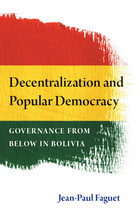
Bolivia decentralized in an effort to deepen democracy, improve public services, and make government more accountable. Unlike many countries, Bolivia succeeded. Over the past generation, public investment shifted dramatically toward primary services and resource distribution became far more equitable, partly due to the creation of new local governments. Many municipalities responded to decentralization with transparent, accountable government, yet others suffered ineptitude, corruption, or both. Why? Jean-Paul Faguet combines broad econometric data with deep qualitative evidence to investigate the social underpinnings of governance. He shows how the interaction of civic groups and business interests determines the quality of local decision making.
In order to understand decentralization, Faguet argues, we must understand governance from the ground up. Drawing on his findings, he offers an evaluation of the potential benefits of decentralization and recommendations for structuring successful reform.

"Deeds Done in Words is a thoughtful survey of how a democracy uses language to transact its business. Based on an enlivened understanding of genre theory and on numerous pieces of original criticism, Campbell and Jamieson vividly show how central public discourse has become the lifeblood of the American polity."—Roderick Hart, author of The Sound of Leadership
"The rhetoric that issues from the White House is becoming an ever more salient part of what the presidency means and does. This acute inquiry provides a great many insights into the forms, meanings, and functions of presidential discourse. It is an enlightening contribution to our understanding of American politics."—Murray Edelman, author of Constructing the Political Spectacle

The difference between developmental success and failure in this view has little to do with natural resource availability, climate, aid, or developed nations' policies. Rather, it is largely a function of whether incentives within a given society steer wealth-maximizing individuals toward producing new wealth or toward diverting it from others. The chapters, seminal essays written by Mancur Olson and his IRIS Center colleagues, provide theoretical and/or empirical underpinnings for the emerging consensus that differences in the way governments and societies are organized have enormous implications for the structure of incentives faced by politicians, bureaucrats, investors, and workers, which in turn determines the level of a nation's material well-being.
Overall this volume applies tools and concepts from the "New Institutional Economics" to some of the major issues in economic development. It will be of interest to scholars and students of various disciplines--including political science, law, and sociology as well as economics--interested in the determinants of economic development and global economic change. The book will also be of interest to many aid practitioners, particularly those working in anticorruption and public sector reform issues.
Stephen Knack is Senior Research Economist, Development Research Group, the World Bank.

“Rule Britannia! Britannia rule the waves,” goes the popular lyric. The fact that the British built the world’s greatest empire on the basis of sea power has led many to assume that the Royal Navy’s place in British life was unchallenged. Yet, as Sarah Kinkel shows, the Navy was the subject of bitter political debate. The rise of British naval power was neither inevitable nor unquestioned: it was the outcome of fierce battles over the shape of Britain’s empire and the bonds of political authority.
Disciplining the Empire explains why the Navy became divisive within Anglo-imperial society even though it was also successful in war. The eighteenth century witnessed the global expansion of British imperial rule, the emergence of new forms of political radicalism, and the fracturing of the British Atlantic in a civil war. The Navy was at the center of these developments. Advocates of a more strictly governed, centralized empire deliberately reshaped the Navy into a disciplined and hierarchical force which they hoped would win battles but also help control imperial populations. When these newly professionalized sea officers were sent to the front lines of trade policing in North America during the 1760s, opponents saw it as an extension of executive power and military authority over civilians—and thus proof of constitutional corruption at home.
The Navy was one among many battlefields where eighteenth-century British subjects struggled to reconcile their debates over liberty and anarchy, and determine whether the empire would be ruled from Parliament down or the people up.



Essays reveal the multiplicity of ways "compulsory masculinity" is imposed upon female leaders who wish to succeed in a man's world, and analyzes the use of interpersonal means to ensure masculine advantage. For example, only one woman in Congress was able to have a direct effect on any reproductive policy; other women experienced sexual harassment by offensive men, which resulted in their being distracted from performing as leaders.
Until now, studies of gender within the field of political science have focused centrally on women. Men have been studied as gendered beings whose thinking has shaped politics in ways advantageous to them, but this volume is unique in crossing multiple levels of analysis and demonstrating the interactive and reinforcing effects of gender power. The book is required reading for political scientists who have frequently been blind to masculinist assumptions and cultural belief systems when gender roles collide with leadership demands for women. It will also appeal to those in public administration and policy, sociology, and business studies.
"An important book that challenges the ways empirical research is done and the ways social scientists think about gender."--Nancy Hartsock, University of Washington
"A very useful book on gender and political leadership that weaves together scholarly research with practical applications and suggestions for change."--Virginia Sapiro, University of Wisconsin, Madison
"A very ambitious book, attempting no less than a paradigm shift in social science thinking."--Marcia Lynn Whicker, Rutgers University
Georgia Duerst-Lahti is Associate Dean and Associate Professor of Government, Beloit College. Rita Mae Kelly is Director and Chair of the School of Justice Studies, and Professor of Justice Studies, Political Science, and Women's Studies, Arizona State University.


In Godliness and Governance in Tudor Colchester Laquita M. Higgs traces the governance and the religion of that town. Though traditional piety held sway early in the Tudor era, there was a strong undercurrent of hereticism, even among town leaders. Such sympathy helps explain Colchester's embrace of Henry VIII's religious reforms. Town governors also found it advantageous to cooperate with the local nobleman, the earl of Oxford, and with their own Thomas Audley, who helped the King shape the reformation. Queen Mary's attempts to root out Protestantism strengthened Colchester's commitment to reform. Under Elizabeth, reformers gradually took over governance of the borough.
Colchester provides one of the earliest illustrations of the workings and tensions of Puritan town governance. Higgs examines the connections between governance and religion with special emphasis on the Elizabethan period. The town's development toward religious radicalism is shown by a comparison of the aldermen of 1530, 1560, and 1590. Higgs explores the camaraderie of the reformers, the attempt of town leaders to correct immoral behavior, and the resultant tensions that produced deep divisions between moderate reformers and radical Puritans. An analysis of extant wills shows the extent to which Puritan governors achieved some degree of success.
Godliness and Governance in Tudor Colchester will be of interest to historians of the Tudor period, Catholicism, Lollardy, and the English Protestant Reformation.
Laquita M. Higgs is Adjunct Lecturer in History, University of Michigan, Dearborn.

Yu Zheng challenges the idea that democracy is the prerequisite for developing countries to attract foreign direct investment (FDI) and promote economic growth. He examines the relationship between political institutions and FDI through the use of cross-national analysis and case studies of three rapidly growing Asian economies with a focus on the role of microinstitutional “special economic zones” (SEZ).
China’s authoritarian system allows for bold, radical economic reform, but China has attracted FDI largely because of its increasingly credible investment environment as well as its central and local governments’ efforts to overcome constraints on investment. India’s democratic institutions provide more political assurance to foreign investors, but its market became conducive to FDI only when the government adopted more flexible investment policies. Taiwan’s democratic transition shifted its balance of policy credibility and flexibility, which was essential for the nation’s economic takeoff and sustained growth.
Zheng concludes that a more accurate understanding of the relationship between political institutions and FDI comes from careful analysis of institutional arrangements that entail a trade-off between credibility and flexibility of governance.

Drawing on recent advances in the social sciences, this volume shows how rigorous, theory-based empirical research can help improve the management of public policies and programs—and how better governance can lead to better performance.
These original essays demonstrate how better data and improved statistical techniques have allowed researchers to construct more complex models of governance processes and thereby assess the effects of many variables on policy and program outcomes. They present useful research results that illuminate such issues as automatic grade advancement in public schools, management of federally-funded job-training programs, reducing welfare caseloads, and management of welfare-to-work programs.
Illustrating a range of theoretical and methodological possibilities, this book shows how more sophisticated research in public management can help improve government performance.

With the rush of calamitous events in recent years—the September 11 terror attacks, the Iraq imbroglio, and hurricanes Katrina and Rita—Americans feel themselves to be living in dark times. Trust in one another and in the government is at low ebb. People in public service face profound challenges to the meaning and efficacy of their work. Where can a public servant turn for a public philosophy to sustain practice?
Inspired by Hannah Arendt and several other philosophers, Governance in Dark Times is the first book to explore the philosophical and value underpinnings needed to guide public servants in these times. Featuring down-to-earth discussions of such issues as terrorism, torture, and homeland security, it suggests ways for people in government to think more deeply, judge more wisely, and act more meaningfully. Camilla Stivers argues that the most urgent requirement in dark times is re-kindling what Arendt called "the light of the public," and offers practical steps for public servants to create spaces for citizen dialogue and engagement in public life. Ideas like "governance of the common ground" and "public service as social hope" will spark discussion and encourage renewed dedication to the work of governing.
Grounded in the author's more than thirty years of teaching and administrative practice, Governance in Dark Times urges public servants in clear, jargon-free prose to reflect, to understand the world we live in, and to act responsibly, both individually and with fellow citizens.

Through a series of close readings at all three levels of the text—the author’s statements, the frame narrative, and the stories themselves—Sherberg shows how Boccaccio exposes and explores gender tensions rooted in a notion of the patriarchal household, which finds its own rationale in the natural-law postulate of the inferiority of women. Relying on the writings of the great twentieth-century legal theorist Hans Kelsen, Sherberg demonstrates how through the complex architecture of the Decameron Boccaccio dismantles the logic of natural law, exposing it instead as a rhetoric used by men to justify their control of women.
The Governance of Friendship aims well to advance our understanding of Boccaccio as an intellectual: not only steeped in the key texts of his time, but also at the forefront of critical thinking about such issues as law and gender which will play out over the coming centuries and beyond.


This book attempts to answer that question, assembling leading experts on the economics of the not-for-profit sector to examine the problems of the health care industry, art museums, universities, and even the medieval church. Contributors look at a number of different aspects of not-for-profit operations, from the problems of fundraising, endowments, and governance to specific issues like hospital advertising.
The picture that emerges is complex and surprising. In some cases, not-for-profit firms appear to work extremely well: competition for workers, customers, and donors leads not-for-profit organizations to function as efficiently as any for-profit firm. In other contexts, large endowments and weak governance allow elite workers to maximize their own interests, rather than those of their donors, customers, or society at large.
Taken together, these papers greatly advance our knowledge of the dynamics and operations of not-for-profit organizations, revealing the under-explored systems of pressures and challenges that shape their governance.

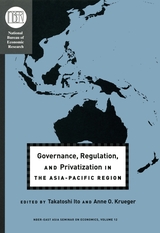
In most contexts, privatization is expected to yield greater efficiency and cost effectiveness while avoiding the corruption and bloated budgets of government regulation or monopoly control. But broad-scale privatization, if ill designed, has also yielded its share of difficulties in East Asia. Privatization sometimes has created a vacuum in corporate governance for some of the region's most important industries and in some cases merely reinstated the monopoly-like configurations. The papers presented in this book discuss the experiences of privatization in several industries, including railroad and telecom, corporate governance problems, accounting issues, and challenges for the future in East Asian countries.
The first section is theoretical in nature and proposes boundaries among government protection, market freedom, and shareholder expectations. The second part is constituted by country case studies, beginning with an analysis of both the Korean financial crisis that followed its 1997 law to privatize large, public sector corporations and the new ways Korean corporations finance themselves. Following is an evaluation of China's approach to privatization, with an in-depth look at the financial transitions of companies slated for initial public offering.
Providing provocative examples of the methods of privatization in the Asia-Pacific region specifically, these papers will be of huge import to any economist or policymaker interested in transposing those successes for their own region.

Actuarial thinking is everywhere in contemporary America, an often unnoticed byproduct of the postwar insurance industry’s political and economic influence. Calculations of risk permeate our institutions, influencing how we understand and manage crime, education, medicine, finance, and other social issues. Caley Horan’s remarkable book charts the social and economic power of private insurers since 1945, arguing that these institutions’ actuarial practices played a crucial and unexplored role in insinuating the social, political, and economic frameworks of neoliberalism into everyday life.
Analyzing insurance marketing, consumption, investment, and regulation, Horan asserts that postwar America’s obsession with safety and security fueled the exponential expansion of the insurance industry and the growing importance of risk management in other fields. Horan shows that the rise and dissemination of neoliberal values did not happen on its own: they were the result of a project to unsocialize risk, shrinking the state’s commitment to providing support, and heaping burdens upon the people often least capable of bearing them. Insurance Era is a sharply researched and fiercely written account of how and why private insurance and its actuarial market logic came to be so deeply lodged in American visions of social welfare.

The last few decades have seen a surge of historical scholarship that analyzes state power and expands our understanding of governmental authority and the ways we experience it. At the same time, studies of the history of intimate life—marriage, sexuality, child-rearing, and family—also have blossomed. Yet these two literatures have not been considered together in a sustained way. This book, edited and introduced by three preeminent American historians, aims to close this gap, offering powerful analyses of the relationship between state power and intimate experience in the United States from the Civil War to the present.
The fourteen essays that make up Intimate States argue that “intimate governance”—the binding of private daily experience to the apparatus of the state—should be central to our understanding of modern American history. Our personal experiences have been controlled and arranged by the state in ways we often don’t even see, the authors and editors argue; correspondingly, contemporary government has been profoundly shaped by its approaches and responses to the contours of intimate life, and its power has become so deeply embedded into daily social life that it is largely indistinguishable from society itself. Intimate States makes a persuasive case that the state is always with us, even in our most seemingly private moments.
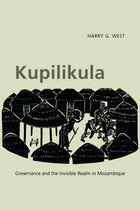
In this historical ethnography of sorcery, Harry G. West draws on a decade of fieldwork and combines the perspectives of anthropology and political science to reveal how Muedans expect responsible authorities to monitor the invisible realm of sorcery and to overturn or, as Muedans call it, "kupilikula" sorcerers' destructive attacks by practicing a constructive form of counter-sorcery themselves. Kupilikula argues that, where neoliberal policies have fostered social division rather than security and prosperity, Muedans have, in fact, used sorcery discourse to assess and sometimes overturn reforms, advancing alternative visions of a world transformed.



Contributors. Timothy Choy, Joseph Dumit, Michael M. J. Fischer, Kim Fortun, Mike Fortun, Donna Haraway, Sheila Jasanoff, Wen-Hua Kuo, Andrew Lakoff, Kristin Peterson, Chloe Silverman, Elta Smith, Kaushik Sunder Rajan, Travis J. Tanner
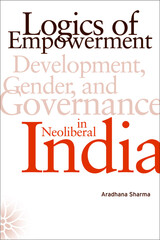

The authors argue that the roles of these systems in cyberspace cannot be fully understood unless they are seen as mutually constituting each other in specific historical structures, institutions, and practices. With vision and insight, the authors look beyond the Internet to examine the entire networked world, from cell phones and satellites to global tourism and business travel.

Death is the opposite not of life, but of power. And as such, Mohammed Bamyeh argues in this original work, death has had a great and largely unexplored impact on the thinking of governance throughout history, right down to our day. In Of Death and Dominion Bamyeh pursues the idea that a deep concern with death is, in fact, the basis of the ideological foundations of all political systems.
Concentrating on four types of political systems—polis, empire, theocracy, and modern mass society systems—Bamyeh shows how each follows a specific strategy designed to pit power against the equalizing specter of death. Each of these strategies—consolation, expansion, preparation, and repression—produces a certain style of political behavior, as well as particular psychic traumas. In making his argument, Bamyeh revisits a wide range of empirical and theoretical discussions in existentialist philosophy, psychoanalysis, comparative historical sociology, literary studies, and anthropology. By demonstrating how schemes of power are by definition also schemes for defying death—despite their claims to the contrary—his book encourages us to think of a new style of politics, one oriented toward life.

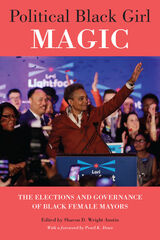
Case studies in this interdisciplinary volume include female mayors in Atlanta, Baltimore, Charlotte, Chicago, Compton, and Washington, DC, among other cities, along with discussion of each official’s political context. Covering mayors from the 1960s to the present, Political Black Girl Magic identifies the most significant obstacles black women have faced as mayors and mayoral candidates, and seeks to understand how race, gender, or the combination of both affected them.
Contributors: Andrea Benjamin, Nadia E. Brown, Pearl K. Dowe, Christina Greer, Precious Hall, Valerie C. Johnson, Yolanda Jones, Lauren King, Angela K. Lewis-Maddox, Minion K.C. Morrison, Marcella Mulholland, Stephanie A. Pink-Harper, Kelly Briana Richardson, Emmitt Y. Riley, III, Ashley Robertson Preston, Taisha Saintil, Jamil Scott, Fatemeh Shafiei, James Lance Taylor, LaRaven Temoney, Linda Trautman, and the editor

The Power of Babel is one of the first comprehensive studies of the complex linguistic constellations of Africa. It draws on Ali Mazrui's earlier work in its examination of the "triple heritage" of African culture, in which indigenous, Islamic, and Western traditions compete for influence. In bringing the idea of the triple heritage to language, the Mazruis unravel issues of power, culture, and modernity as they are embedded in African linguistic life.
The first section of the book takes a global perspective, exploring such issues as the Eurocentrism of much linguistic scholarship on Africa; part two takes an African perspective on a variety of issues from the linguistically disadvantaged position of women in Africa to the relation of language policy and democratic development; the third section presents a set of regional studies, centering on the Swahili language's exemplification of the triple heritage.The Power of Babel unites empirical information with theories of nationalism and pluralism—among others—to offer the richest contextual account of African languages to date.

Risk is a part of life. How we handle uncertainty and deal with potential threats influence decision making throughout our lives. In The Risk Society Revisited, Eugene A. Rosa, Ortwin Renn, and Aaron M. McCright offer the first book to present an integrated theory of risk and governance.
The authors examine our sociological understanding of risk and how we reconcile modern human conditions with our handling of risk in our quest for improved quality of life. They build a new framework for understanding risk—one that provides an innovative connection between social theory and the governance of technological and environmental risks and the sociopolitical challenges they pose for a sustainable future.
Showing how our consciousness affects risk in the decisions we make—as individuals and as members of a democratic society—The Risk Society Revisited makes an important contribution to the literature of risk research.




This first of two volumes of Voegelin's miscellaneous papers brings together crucial writings, published for the first time, from the early, formative period of this scholar's thought. The book begins with Voegelin's dissertation on sociological method, completed under the direction of Othmar Spann and Hans Kelsen at the University of Vienna in 1922. It reveals an intimate knowledge of the writings of Georg Simmel and a skillful use of insights gained from Edmund Husserl's Logical Investigations and Ideas.
The dissertation, and other smaller pieces written at this time, addresses problems that remained of great importance to Voegelin throughout his life: the relation of insight to language, the structure of the human being, and the human's spiritual center. They disclose both Voegelin's theoretical reference points during these early years, including the thought of Henri Bergson, Othmar Spann, Georg Simmel, and Edmund Husserl, as well the young scholar's remarkably independent approach to theoretical problems.
Moreover, this volume includes a work that is fundamental to an understanding of Voegelin's theoretical development: his extended study on the "theory of governance," written between 1930 and 1932. It follows the issues that confront political society to their roots in the soul and in the soul's relationship to the ground of being.
The Theory of Governance and Other Miscellaneous Papers presents a meditative-exegetic study of texts from Augustine, Descartes, and Husserl, early examples of the meditations that became central to Voegelin's later work. Other essays included in this volume such as "Theory of Law" and "Political Theory as Human Science" develop these theoretical insights and refine Voegelin's methodological tools. This volume will be of interest to all scholars of the work of Eric Voegelin and of the refoundation of political philosophy in the twentieth century in general.

This collection examines the forces, both external and internal, that lead corporations to behave efficiently and to create wealth. Corporations vest control rights in shareholders, the author argues, because they are the constituency that bear business risk and therefore have the appropriate incentives to maximize corporate value. Assigning control to any other group would be tantamount to allowing that group to play poker with someone else's money, and would create inefficiencies. The implicit denial of this proposition is the fallacy of the so-called stakeholder theory of the corporation, which argues that corporations should be run in the interests of all stakeholders. This theory offers no account of how conflicts between different stakeholders are to be resolved, and gives managers no principle on which to base decisions, except to follow their own preferences.
In practice, shareholders delegate their control rights to a board of directors, who hire, fire, and set the compensation of the chief officers of the firm. However, because agents have different incentives than the principals they represent, they can destroy corporate value unless closely monitored. This happened in the 1960s and led to hostile takeovers in the market for corporate control in the 1970s and 1980s. The author argues that the takeover movement generated increases in corporate efficiency that exceeded $1.5 trillion and helped to lay the foundation for the great economic boom of the 1990s.



Success in war ultimately depends on the consolidation of political order. Nadia Schadlow argues that the steps needed to consolidate a new political order are not separate from war. They are instead an essential component of war and victory.
The challenge of governance operations did not start with the wars in Iraq and Afghanistan. The US Army’s involvement in the political and economic reconstruction of states has been central to all its armed conflicts from large-scale conventional wars to so-called irregular or counterinsurgency wars. Yet, US policymakers and military leaders have failed to institutionalize lessons on how to consolidate combat gains into desired political outcomes. War and the Art of Governance examines fifteen historical cases of US Army military interventions, from the Mexican War through the wars in Iraq and Afghanistan. Improving future outcomes will require US policymakers and military leaders to accept that plans, timelines, and resources must be shaped to reflect this reality before they intervene in a conflict, not after things go wrong.
Schadlow provides clear lessons for students and scholars of security studies and military history, as well as for policymakers and the military personnel who will be involved in the next foreign intervention.
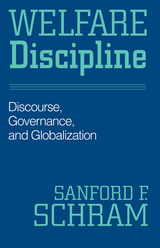
In Welfare Discipline, Schram argues that it is time to take stock of the new forms of welfare and to develop even better methods to understand them. He argues for a more contextualized approach to examining welfare policy, from the use of the idea of globalization to justify cutbacks, to the increasing employment of U.S. policy discourse overseas, to the development of asset-based approaches to helping the poor.
Stressing the importance of understanding the ways we talk about welfare, how we study it, and, critically, what we do not discuss and why, Schram offers recommendations for making welfare policy both just and effective.

READERS
Browse our collection.
PUBLISHERS
See BiblioVault's publisher services.
STUDENT SERVICES
Files for college accessibility offices.
UChicago Accessibility Resources
home | accessibility | search | about | contact us
BiblioVault ® 2001 - 2024
The University of Chicago Press









